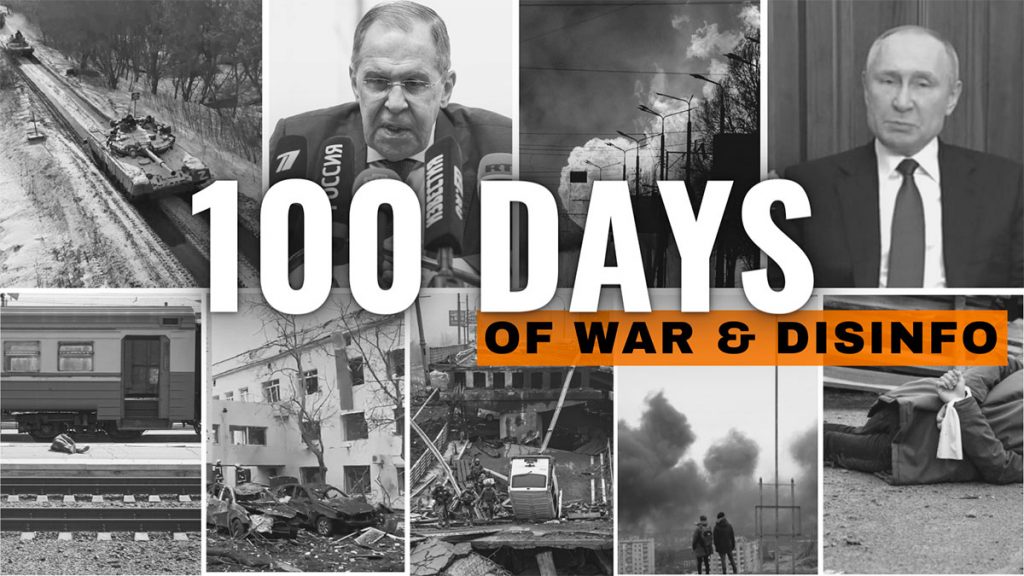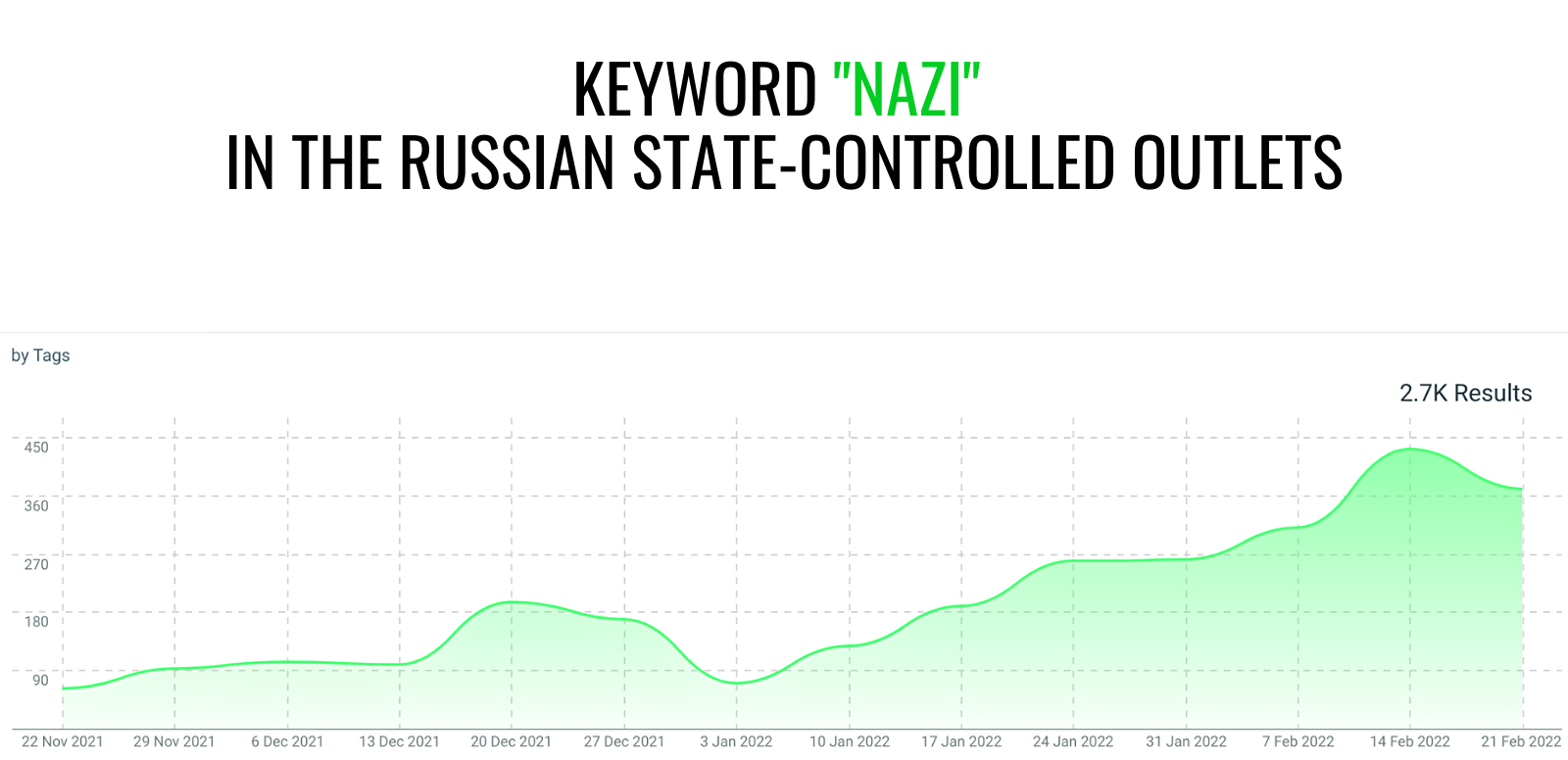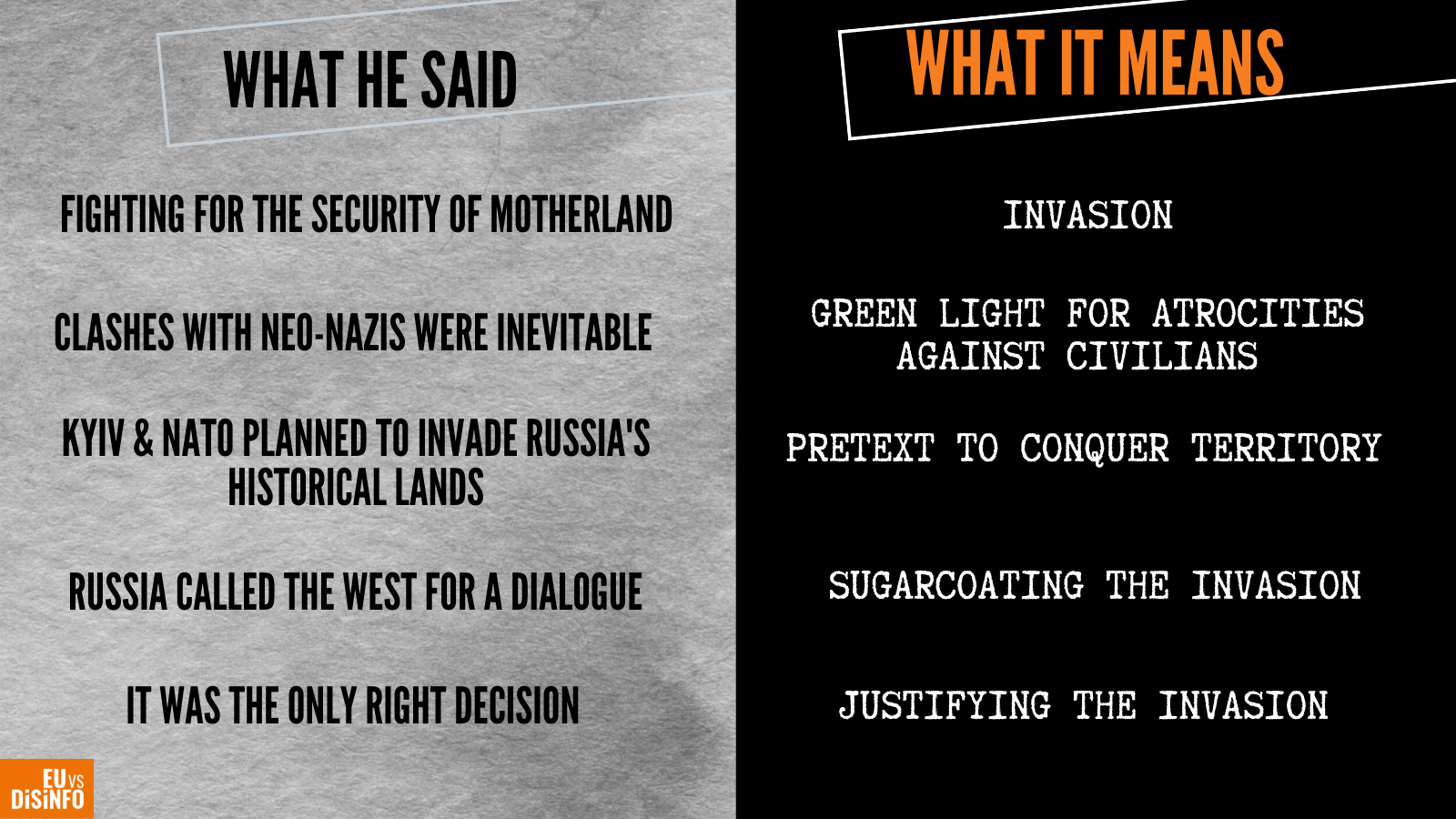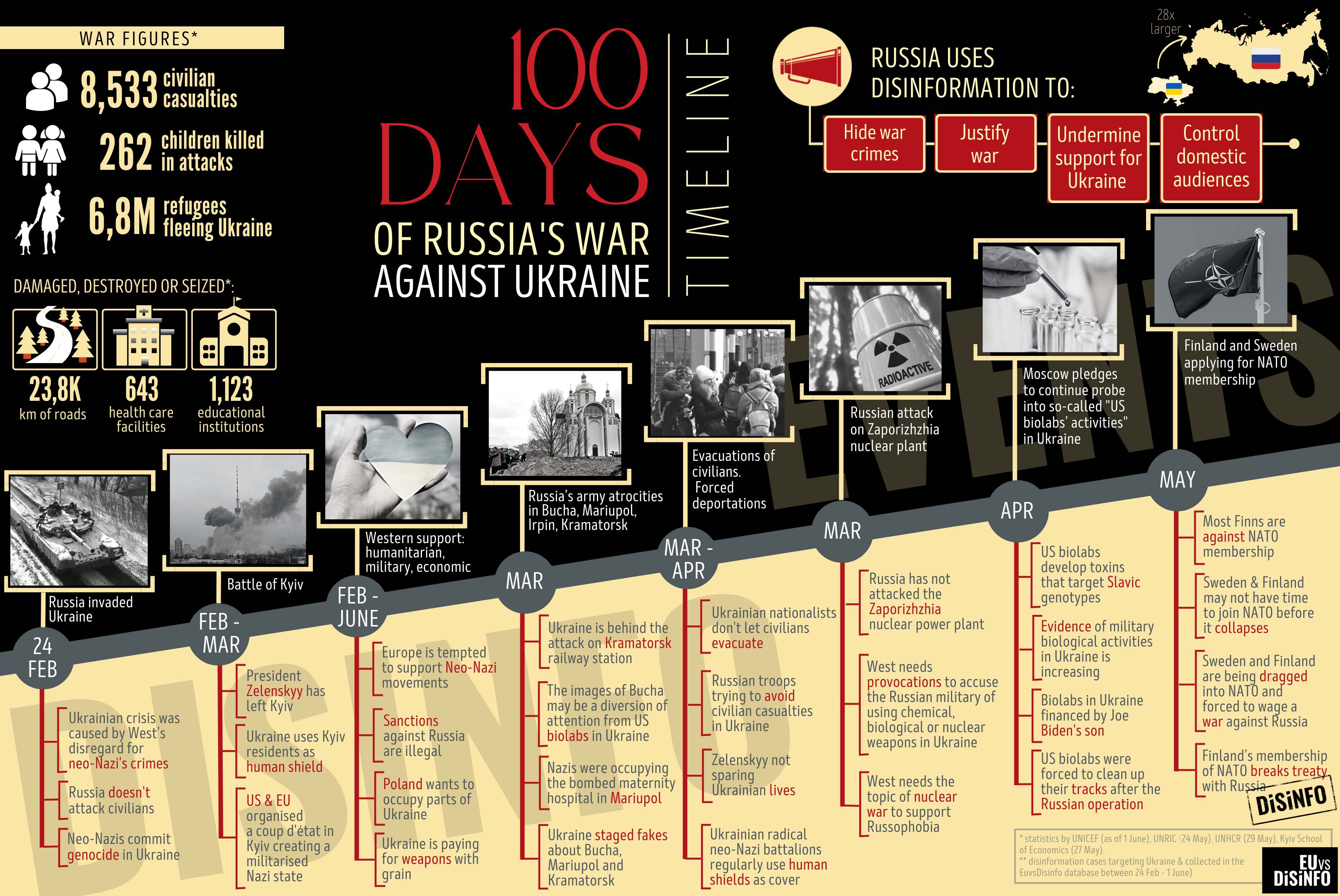The orchestrators of the Kremlin’s lies about Russia’s war of aggression in Ukraine may have come to realise that the battle for the hearts and minds of Western audiences may have already been lost.


EUvsDiSiNFO — June 03 —
One hundred days have passed since Putin unleashed his “three-day war” against Ukraine, perhaps expecting a quick victory or believing his own lies and propaganda. It is important to understand, though, that the Kremlin’s information manipulation and disinformation attacks against Ukraine had been launched years in advance of the war, which began on 24 February 2022. The Russian state-controlled disinformation apparatus, often led by the generously funded media outlets RT and Sputnik, self-described weapons of information, had manufactured myths and false pretexts for invading Ukraine for years, dating back to at least 2014. The EUvsDisinfo database has collected more than 5000 individual cases of disinformation targeting Ukraine, which is well over one-third of all cases in our database. These pro-Kremlin disinformation narratives span far and wide, from accusing the West of planning world domination, to alleging an unholy alliance between Ukraine and Satan himself.
There are two narratives in the Kremlin’s playbook that have risen to hitherto unseen prominence and stand well above the others. First is the rampant claim that hysterical “Russophobia” has enthralled the world. In its essence, this disinformation narrative is quite simple – everyone who opposes or criticises Russia, or its actions, is doing so out of irrational fear and unsubstantiated hatred for all things Russian.
At first, the “Russophobia” disinformation narrative mostly targeted Ukraine, as well as those EU member states who have been vocal about Russia’s increasingly aggressive and belligerent behaviour, such as Poland, Czechia or the Baltic states. However, as the EU response to Russia’s war(opens in a new tab) in Ukraine grew stronger, pro-Kremlin disinformation outlets started levelling accusations of “Russophobia” spreading like wildfire across Europe. Peddling fear and hatred, while playing the “victim card”, also quickly became a favourite pastime for the Russian diplomatic corps and government officials. As far as disinformation tactics go, this is quite a common approach – to deny and distract from valid criticisms by invoking false injustices. Of course, like in the fable about the boy who cried wolf, invoking “Russophobia” in response to every step the West takes to dissuade Russia from continuing its aggression, means the credibility of the Kremlin’s “Russophobia” claims is quickly wearing thin.
Second, are the baseless claims that Ukraine has become a breeding ground for Nazis who present an existential threat to all things Russian. The invocation of Nazism in pro-Kremlin disinformation is neither new nor particularly inventive. “Denazification” was one of the centrepieces of Putin’s speech on 24 February, which laid out the justification for Russia’s “special operation”. For decades, the defeat of Nazism in the Second World War has been portrayed with utmost sanctity and reverence. So, drumming up a false Nazi threat in Ukraine has a powerful psycho-emotional impact on Russian society as a call to arms. The pro-Kremlin disinformation ecosystem was saturated with narratives of “Nazi Ukraine” in the weeks leading up to the war, whipping up the nation into feverish support for the Kremlin’s “denazification” ideas.

In fact, Putin has carefully cultivated a widespread obsession with expunging Nazism wherever it may be found, and styled Russian pseudo-imperialism, safeguarded by the Kremlin, as the only antidote. A little more than a month had passed since Russia started the war, when RIA Novosti, one of the leading Russian state-controlled outlets, published an odious article by the Kremlin-affiliated Russian film director and political philosopher, Timofey Sergeytsev. Unflinchingly, it laid out a perverted intellectual framework, forming the background to the atrocities Russia has committed in Ukraine, all supposedly in the name of “denazification”.
So, as Russia’s war of aggression trudges on, and its disinformation grows ever more dire, in the twisted-mirror logic of the Kremlin it made sense to merge these two narratives into one supremely absurd claim – “Russophobia” has become the new defining characteristic of Nazism, reborn in Ukraine, and now spreading rampantly across Europe. Accusing Israel of being Nazi is a case in point of how far Russian propagandists have strayed from the course of reason.
Kremlin Newspeak
Of course, pro-Kremlin disinformation does not end with peddling the meta-narratives of “Russophobia” and “Nazi Ukraine”. Even before the war started, we noted a new trend in Russian state-controlled media, spearheaded by the liar-in-chief Putin himself. This is a sustained Orwellian effort to redefine the terminology which the Kremlin uses to describe Russia’s war in Ukraine, in a way that denies reality, and dismisses Russian culpability in any wrongdoing. The most blatant examples of the Kremlin’s newspeak appeared in Putin’s speech on 24 February, where an all-out attack, with missile strikes, air and land invasion, became a “special military operation”, and “Russian self-defence”. In reality this was an unprovoked attack and invasion of a sovereign, neighbouring state. As the war rages on, the Kremlin continues to abuse language and warp reality to fit its twisted designs.

The pervasiveness of Kremlin newspeak should not be taken lightly, or dismissed as a product of different linguistic and literary traditions. Language matters, and framing unprovoked aggression in clear, internationally understood terms is essential for holding the perpetrators to account. If there is no “war”, Russia cannot possibly commit “war crimes”; if there is no concept of Ukraine, Russia cannot possibly be violating its sovereignty. Therefore, the deployment of this kind of newspeak becomes essential in order to justify unjustifiable violence, and deny any responsibility under international law. It also goes hand-in-hand with Russian state-orchestrated efforts to warp reality at home, including by staging spectacles of alleged support for the criminal actions of Russia in Ukraine.
Moving the Goalpost Mid-Play
Perhaps the most significant characteristic of the Kremlin’s disinformation campaign and information manipulation targeting Ukraine throughout Russian war of aggression, is its adaptability to new realities. In other words, over the past hundred days, the Kremlin has been constantly moving the goalposts of its disinformation, in an effort to redefine what the objectives of the “special operation” are, and what “success” might look like for the Russian Armed Forces invading Ukraine.

At the outset, the Kremlin’s objectives were clear, and the accompanying disinformation boastful and ambitious. Ukraine was to be completely “de-Nazified”, and a new government, loyal to the Kremlin, installed in Kyiv. This was to be achieved swiftly and without significant resistance in Ukraine. The pro-Kremlin disinformation outlets were so confident, or more likely so self-deluded, that the most eager of them even rushed ahead of schedule to publish a celebratory article only a few days into the war. While the article was almost immediately retracted, it allowed a glimpse into the inner workings of the pro-Kremlin disinformation apparatus, and exposed its overarching goal to manipulate information to warp reality.
Of course, the envisaged swift three-day victory remained only a phantasm in the disinformation-addled minds of the Kremlin’s propagandists. After about a month of incredible Ukrainian resilience and perseverance in the face of an overbearing Russian onslaught, the victories touted in the early days of the war were nowhere in sight. And the pro-Kremlin disinformation machine adapted once again. This time, the goalposts for success moved to diminishing the capabilities of the Ukrainian Armed Forces, so that Russia could focus on establishing full control over occupied territories in Eastern Ukraine. In other words, the plan all along was to “liberate” the Donbas.
The notion of “liberation” also plays an integral part in pro-Kremlin disinformation about its war of aggression. It is most commonly deployed to deceive audiences about atrocities Russia has committed in occupied territories in Ukraine. The disinformation narrative of “liberation” also serves to conjure up justification for the invasion(opens in a new tab), by falsely claiming that local people across Ukraine welcome the Russian invaders.
When about three months of Putin’s “three day war” had passed, the pro-Kremlin disinformation machine moved the goalposts once again. That new Orwellian newspeak claim, made by the Defence Minister Sergei Shoigu at a Collective Security Treaty Organisation (CSTO) meeting, was that Russia was deliberately slowing the pace of war(opens in a new tab) to avoid civilian casualties. While this claim followed the disinformation pattern of manipulating information to always portray Russia as infallible, it was also incredibly cynical, considering that the Office of the UN High Commissioner for Human Rights (OHCHR) has recorded 8,900 civilian casualties(opens in a new tab) as of 30 May 2022. These are the civilian victims of Russia’s invasion and aggression, and the real numbers are likely much higher.
War Crimes under the Guise of Humanitarianism
Besides moving the goalposts for success, Russian state-controlled disinformation outlets also actively advance false “humanitarianism” narratives for another purpose. As the world inevitably learned of the senseless atrocities Russia committed in Ukraine, increasingly amounting to war crimes, the pro-Kremlin disinformation ecosystem went into overdrive to deny, confuse, distract, dismay, and shift the blame.
On 9 March, Russian Air Force unleashed indiscriminate air-strikes on a maternity ward and children’s hospital in Mariupol. When gruesome images of injured pregnant women being evacuated through the smouldering remains of the bombed hospital began to flood the international media, the Kremlin’s initial reaction was as expected – flat out denial of reality. When reality could no longer be denied, an outpouring of the Kremlin’s lies began, ranging from claims that Nazis had been hiding in the hospital, to falsely alleging the injured women were hired actors.
On 4-5 April, the world learned more shocking truths of what Russian “liberation” of Ukraine looked like in the town of Bucha on the outskirts of Kyiv. As Russian troops withdrew, and the Ukrainian Armed Forces took control of the town, the horrific sights on the streets defied description. Innocent Ukrainian civilians had been summarily killed, execution-style, their remains left to waste in the streets which seeped with the blood of innocents. The brutality of these images was such that denial would not work, although initially claims surfaced that the Bucha massacre was staged by Ukraine. So, in an effort to distract the world from the possible war crimes it had committed in Bucha, the Kremlin pulled another trick out of its disinformation bag – historic relativism. Just a few days afterwards, Russian trolls unleashed a distraction campaign, attacking hundreds of Polish politicians, public figures and journalists, pushing a disinformation narrative of historic relativism, by comparing Bucha to the Volyn Massacre during the Second World War.

On 8 April, a Russian Armed Forces missile strike hit the Kramatorsk railway station, killing dozens of innocent people fleeing the horrors of war. Russia followed its well-established pattern of disinformation. First came denial of the fact, then dismissal of all responsibility, and finally, distorting the truth. Curiously, this case showed that the Russian state-controlled disinformation machine is not always watertight, because some of the more eager Russian disinformation actors rushed to report a successful Russian missile strike(opens in a new tab), before hurriedly denying it ever happened.
These are just three examples of the many instances where Russia has breached international law, and abandoned morality, by indiscriminately targeting civilians in Ukraine, and using its sizeable disinformation machine to attempt to warp the reality of its brutal war in Ukraine, by shifting the blame for possible war crimes committed by the invading Russian troops and their Kremlin masters.
Recycling Previously Planted Disinformation Narratives
Over the first hundred days of the war, the pro-Kremlin disinformation outlets became increasingly adept at recycling and refurbishing previously established disinformation narratives, to distract from the ongoing ravages of war, and provide false justification for its violations of international law. The example that stood out the most was the revival of the long-established narrative about biological research labs(opens in a new tab), allegedly funded by the US to develop illegal weapons in Ukraine. Rooted in fringe conspiracy theories, and although thoroughly debunked, this disinformation narrative was broadly disseminated by Russian state-controlled outlets. Interestingly, this narrative also found willing amplifiers beyond the traditional scope of the pro-Kremlin disinformation ecosystem, with Chinese state-affiliated media actively engaging in the revival of this old story.
Another example of recycling old disinformation tropes to distract from Russia’s war in Ukraine, was to invoke fears of migration, and peddle xenophobia targeting Ukrainian refugees fleeing the horrors of war. The pro-Kremlin disinformation apparatus particularly targeted countries neighbouring Ukraine, attempting to vilify Ukrainian refugees and sow divisions with the local population. Yet, the fact remains that since 24 February, Europe has welcomed more than 5 million Ukrainian refugees. (opens in a new tab)
These efforts to recycle and refurbish all the previous lies came to a head in Putin’s speech on 9 May, which essentially repackaged the same outrageous disinformation narratives he had used on 24 February to launch an unjustifiable war. Of course, since the pace of war, or rather, “special operation”, had not gone exactly as expected, in the weeks leading up to the “victory day” parade, the Kremlin deployed all its disinformation tricks to manage expectations, warp reality and prepare audiences for come what may. Once the time came for Putin’s speech on 9 May, it was also packed full of the kind of Orwellian newspeak pro-Kremlin media had deployed throughout the war to wrap the truthful reality of its crimes in a shroud of lies and deceit.
See No War, Hear No War, Speak No War
The orchestrators of the Kremlin’s lies about Russia’s war of aggression in Ukraine may have come to realise that the battle for the hearts and minds of Western audiences may have already been lost. In large part because of the inherent resilience of a truly open and pluralistic media at the heart of the Western information environment. So, in a somewhat panicked attempt to restrict access to truthful information in Russia, a little over a week into the war, the Russian parliament adopted a law envisioning draconian punishments for voicing criticism or deviating from the official government line. Even the very mention of “war” could now carry a 15 year prison sentence in Russia.
But imposing censorship laws reminiscent of the darkest days of the Soviet Union was just the first step in the Kremlin’s efforts to shape reality, by distorting the information space beyond all recognition. The Russian media-watchdog-turned-censor Roskomnadzor also blocked access to Twitter, Facebook and Instagram, and has since applied continuous pressure and bullying tactics against YouTube and Wikipedia. Meanwhile, the Russian people could feel the censorship noose tightening and rushed to download offline back-up copies of Wikipedia(opens in a new tab), and the usage of VPN services in Russia has skyrocketed(opens in a new tab) since the beginning of the war.
Russia’s war of aggression in Ukraine also exposed the true scope of the Kremlin’s paranoid fear of a free and independent media, regardless of the channels used. Foreign media outlets, such as the BBC, Deutsche Welle, RFE/RL, Euronews, CNN and ABC were suspended almost immediately. Russian media outlets, that might have otherwise reported the truth about the criminality of the war, were quickly silenced. The Kremlin rapidly crippled the last free radio station, the renowned Radio Echo Moscow, while Roskomnadzor bullied the Nobel Peace Prize winning Novaya Gazeta, and its editor-in-chief Dmitry Muratov, into silence(opens in a new tab).
So, the destruction of free and independent media in Russia is nearly complete, and the information vacuum, consciously created and manipulated by the Kremlin, has led to increasing self-delusion, which is crucial for the Kremlin to warp reality and sustain popular support for Russia’s war in Ukraine.
Disinformation Rages On
Ukraine continues the heroic struggle for its freedom, independence and dignity. It has weathered a hundred days of unimaginable Russian brutality, both in the trenches of war on the battlefield, and across many platforms in the information space. Pro-Kremlin disinformation and information manipulation will continue, as Russia seeks to justify an unjustifiable act of violence against a peaceful neighbour. And no methods and tactics are considered off limits by the liar-in-chief in the Kremlin. Sure as day, Russia will play the “victim card” again, after having essentially forced Sweden and Finland into seeking NATO membership. It will feel no shame in drumming up panic about a global food crisis, while shifting the blame for initiating it by launching an unprovoked war against Ukraine.
Ukraine has already withstood the initial brutality of Russia’s onslaught, galvanised international support, and shown the world the true meaning of the courage to stand up for the fundamental values of freedom, sovereignty and the right to self-determination. Ukraine has also braved an unprecedented pro-Kremlin disinformation campaign, and information manipulation, to support Russia’s criminal war. As the international community continues to support Ukraine’s struggle for freedom and sovereignty, it must also spare no effort in dismantling the pernicious false reality about the war, which Russia has built on lies and deceit.










